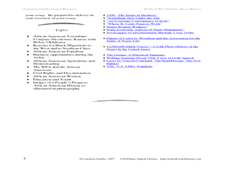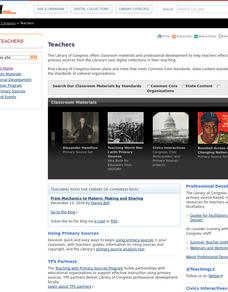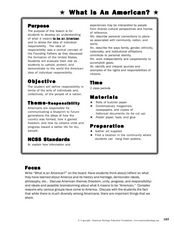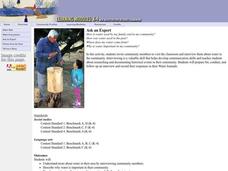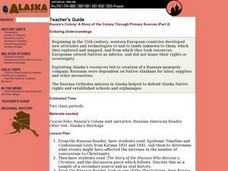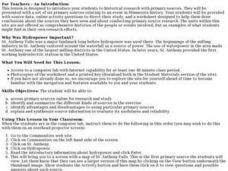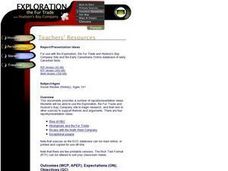Curated OER
Changes in the Community
Third graders examine and describe a series of primary sources (mostly photographs) to observe and analyze changes over time. The focus is on the local community. The local community might be a city, township, county or surrounding area.
Curated OER
The Vietnam War
Students acquire information about the Vietnam War Era from the internet, textbook and various sources. They transfer the information that they have acquired into a newspaper format. Students create editorials, cartoons, graphics and...
Curated OER
Discovering the Local Community
Third graders create a mini-atlas of the human and physical characteristics of their local community, which includes landforms, climate, vegetation, population, and economics. They use nonfiction map-related resources to obtain ...
Curated OER
A New Deal for African Americans
Students consider how New Deal programs impacted African Americans. In this New Deal lesson, students collaborate to research Internet and print sources regarding selected New Deal programs and African Americans. Students write essays...
Curated OER
When Work is Done
Eleventh graders create an album based on a thesis statement about life in the 20th century after completing the introductory lesson for a lesson on the web site "When Work is Done".
Curated OER
Hammurabi's Code: What Does It Tell Us About Old Babylonia?
Students examine Hammurabi's Code. They take on the role of his council of advisors and report their "advice" to the king. They write an essay discussing an aspect of daily life that the Code exemplifies.
Curated OER
Capitals, Designers & Common Fashion Terms
The importance of fashion on society is identified and new vocabulary associated with fashion is defined. Using the internet, your class will identify the major fashion capitals of the world and write about one. To end the lesson, they...
Curated OER
"We, the People": New Voices in the Constitutional Debates
Students study the goals set out for the Constitution. They examine the resolutions arrived at to resolve three major conflicts which arose during the writing of the Constitution. They discuss or write down a one-sentence summary of...
Curated OER
To War Or Not To War?
Seventh graders research the political, societal, and economic factors of World War I, World War II, and the 2001 war against terrorism. They participate in class discussions, write journal entries, and conduct Internet research. ...
Curated OER
A Differentiated Way through Think Dots
Learners examine reasons that led people to explore, identify "West" as defined following Revolutionary War, explain importance of finding natural resources, develop time line of dates and events leading up to Lewis and Clark Expedition,...
Curated OER
An Upbeat West Side Story: Puerto Ricans and Postwar Racial Politics in Chicago
Tenth graders read an article about the migration of Puerto Ricans to Chicago. As a class, they identify the barriers the immigrants faced regarding employment and separation from family members. To end the instructional activity, they...
Curated OER
Dangers of the West
Eighth graders explore the American West. In this Westward Expansion lesson plan, 8th graders examine primary sources to investigate the dangers travelling to and settling in the American West. Students design brochures that would help...
Curated OER
Twentieth Century Entertainment: When Work is Done
Students determine how Americans enjoy leisure time. In this 20th century America lesson, students research primary sources to study how Americans gained leisure time during the century and what they did with it.
Curated OER
What is an American?
Learners investigate how the definition of being American has changed over the years using online primary source documents.
Curated OER
Ask An Expert
Students invite community members to visit the classroom and interview them about water in the community. Students prepare for, conduct, and follow up an interview and record their responses in their Water Journals.
Curated OER
Russia's Colony: A Story of the Colony Through Primary Sources
Students read "Epidemic Timeline and Confessional Lists from Katmai 1831 and 1845." They construct a picture of life in Alaska during the Russian period.
Curated OER
An Introduction:
Learners explore historical research with primary sources about Hydropower.
Curated OER
Work in Post-World War II Wisconsin
Students explore the changing nature of work in postwar America by analyzing a variety of sources and conducting their own research. They answer the question, "How did work change in Wisconsin after World War II?"
Curated OER
Alexander Graham Bell's Patent for the Telephone and Thomas Edison's Patent for the Electric Lamp
Students read a short biographical account about Bell and student B about Edison. Ask each pair to exchange information and determine what qualities these inventors shared. Ask students if they think all inventors share these qualities.
Curated OER
Report/Presentation Ideas
Students use the ECO Exploration, the Fur Trade and Hudson's Bay Company, the ECO database, as well as other sources identified to develop a report or presentation on some aspect of Hudson's Bay Company and life in what would one day...
Curated OER
Will the Real Ben Franklin Please Stand Up?
Students explore the life and accomplishments of Benjamin Franklin. In this colonial history lesson, students research Benjamin Franklin's work as a printer, a writer, a statesman, and an inventor. Students determine what his most...
Curated OER
Civil War Images: It's in the Cards!
Eighth graders review important figures of the Civil War. In this American Civil War activity, 8th graders create flash cards of historical figures of the war and use them to review the war.
Curated OER
The Second Amendment and the Right to Bear Arms
Students interpret the Second Amendment. In this U.S. Constitution lesson, students examine the right to bear arms as they compare 2 Michigan Supreme Court cases and discuss their personal interpretations of the amendment.





